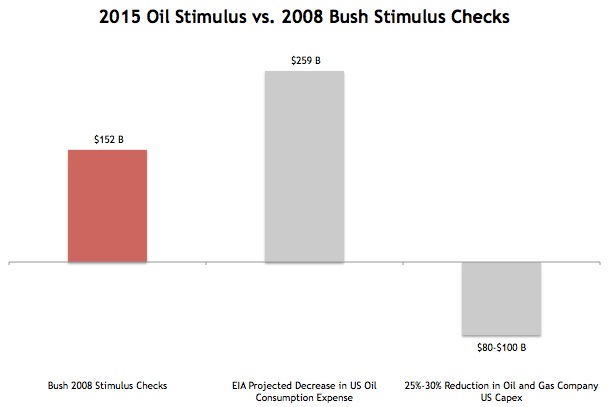Last week on SunTrust's (NYSE:STI) conference call, the bank’s CEO noted that the decline in oil prices should give the US consumer an income benefit roughly equivalent to the size of a tax refund. That comment got me thinking about another stimulus of days past: the Bush administration’s 2008 stimulus checks.
Back in February of 2008, as the recession was just getting started, congress passed the Economic Stimulus Act of 2008, which gave a $300 check to almost every man, woman and child in America. The total cost of that stimulus was projected to be $152 Billion. Despite much fanfare, it’s not clear that the program ever made much of a difference to the magnitude of the ensuing recession.
By comparison, today’s oil stimulus could be in the range of $250-$300 B depending on what numbers you use. According to EIA estimates, the US will spend $259 B less on oil in 2015 vs. 2014. According to retail sales data, Americans spent $533 B at gas stations last year, which means a 50% decline in spend would be $266 B.
Unlike the 2008 checks though, 2015′s oil decline isn’t pure stimulus. The money comes out of the pockets of the oil and gas industry. The US is a net importer of oil, so it’s true that net-net, falling oil prices should be a benefit. However, if oil and gas company Capex (BA:CPS) spending falls by 25%-30% this year (as many oil-services companies were talking about last week), that would be an $80-$100 B headwind to the US economy.
If you net those two numbers out, you get an oil stimulus that is roughly equivalent in size to the Bush stimulus checks.

Source: CBO, EIA, Oil and Gas Journal
